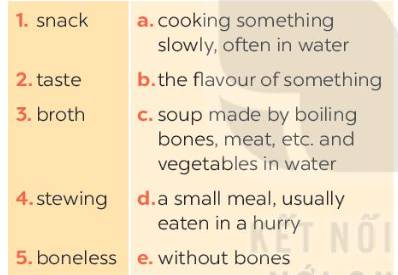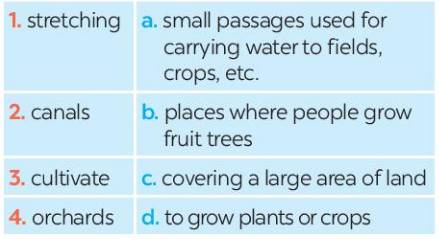2. Read Phong's blog. Match the underlined words in the text with their meanings.


Read the text about life in a village in Viet Nam. Match the highlighted words in the text with their meanings.
I feel fortunate that I am living in a peaceful village in southern Viet Nam. The scenery here is beautiful and picturesque with vast fields stretching long distances. The houses are surrounded by green trees. There are lakes, ponds, and canals here and there. The air is fresh and cool. Life here seems to move more slowly than in cities. The people work very hard. They grow vegetables, cultivate rice, and raise cattle. At harvest time, they use combine harvesters to harvest their crops. Many families live by growing fruit trees in the orchards. Others live by fishing in lakes, ponds, and canals. Life in the village is very comfortable for children. They play traditional games. Sometimes they help their parents pick fruit and herd cattle.
People in my village know each other well. They are friendly and hospitable. They often meet each other in the evening, eating fruit, playing chess, singing folk songs, and chatting about everyday activities.

1c: stretching: covering a large area of land
2a: canals: small passages used for carrying water to fields, crops, etc.
3d: cultivate: to grow plants or crops
4b: orchards: places where people grow fruit trees
1 - c: stretching - covering a large area of land
(trải dài – bao phủ một vùng đất rộng lớn)
2 - a: canals - small passages used for carrying water to fields, crops, etc.
(kênh đào – một đoạn nhỏ dùng để mang nước đến cánh đồng, hay vùng trồng nông sản v.v)
3 - d: cultivate - to grow plants or crops.
(trồng trọt – trồng cây hoặc nông sản)
4 - b: orchards - place where people grow fruit trees
(vườn ăn trái – nơi mọi người trồng cây ăn quả)
Tạm dịch:
Tôi cảm thấy may mắn vì tôi đang sống trong một ngôi làng yên bình ở miền Nam Việt Nam. Cảnh vật ở đây đẹp như tranh vẽ với những cánh đồng bạt ngàn trải dài tít tắp. Những ngôi nhà được cây xanh bao quanh. Có nhiều hồ, ao và kênh ở khắp hơi. Không khí trong lành và mát mẻ. Cuộc sống ở đây dường như diễn ra chậm hơn trên thành phố. Mọi người làm việc chăm chỉ. Họ trồng rau, cấy lúa và chăn nuôi gia súc. Vào mùa thu hoạch, họ sử dụng máy gặt đập liên hợp để thu hoạch nông sản. Nhiều gia đình sống bằng cách trồng cây ăn quả trong vườn. Những người khác sống bằng cách đi câu cá trong các hồ ao và kênh. Cuộc sống ở vùng quê rất thoải mái cho trẻ con. Chúng chơi những trò chơi truyền thống. Thi thoảng, chúng giúp bố mẹ bằng cách đi hái trái cây và đi chăn gia súc.
Những người trong làng tôi biết nhau rất rõ. Họ rất thân thiện và hiếu khách. Họ thường gặp nhau vào mỗi buổi tối, ăn trái cây, chơi cờ, hát dân ca và nói chuyện về những hoạt động hằng ngày.
2. Read the following text about leisure activities of Vietnamese teenagers. Match the words in A with their meanings in B.
A recent survey conducted by TIRA, a Vietnamese research company, highlights problems about the lifestyles of Vietnamese teenagers in urban areas. There is an imbalance in their consumption of time for studying and recreational activities. On average, these teenagers spend 9.5 hours a day on studies at school and at home. They only have about four hours for entertainment. Most of this time is spent on watching television and the internet, where they chat through social networks. The teenagers admit that they use computers to play games and to chat with friends much more than using it for studying purposes. The survey also shows that during summer months, despite having much more free time than during school years, these teenagers still fail to manage their time properly. They stay in bed longer, and then get hooked on games and TV. The time for computers and TV increases significantly to about five or six hours a day, while there is almost no time for physical outdoor activities. |
A | B |
1. highlight | A. a lack of proportion or relation between things |
2. imbalance | B. agree, often unwillingly, that something is true |
3. admit | C. a lot/to a great extent |
4. manage | D. draw attention to |
5. significant | E. control |
2. Read the following text about leisure activities of Vietnamese teenagers. Match the words in A with their meanings in B.
A recent survey conducted by TIRA, a Vietnamese research company, highlights problems about the lifestyles of Vietnamese teenagers in urban areas. There is an imbalance in their consumption of time for studying and recreational activities. On average, these teenagers spend 9.5 hours a day on studies at school and at home. They only have about four hours for entertainment. Most of this time is spent on watching television and the internet, where they chat through social networks. The teenagers admit that they use computers to play games and to chat with friends much more than using it for studying purposes. The survey also shows that during summer months, despite having much more free time than during school years, these teenagers still fail to manage their time properly. They stay in bed longer, and then get hooked on games and TV. The time for computers and TV increases significantly to about five or six hours a day, while there is almost no time for physical outdoor activities. |
A | B |
1. highlight | A. a lack of proportion or relation between things |
2. imbalance | B. agree, often unwillingly, that something is true |
3. admit | C. a lot/to a great extent |
4. manage | D. draw attention to |
5. significant | E. control |
3. Write a short paragraph (80-100 words) about the differences between the countryside and the city.
| You should write about: |
| - Environment |
| - Education |
| - Traffic |
| - Whether you want to live in the countryside or not |
____________________________________________________________________________________ | |
____________________________________________________________________________________ | |
____________________________________________________________________________________ | |
2. Read the following text about leisure activities of Vietnamese teenagers. Match the words in A with their meanings in B.
A recent survey conducted by TIRA, a Vietnamese research company, highlights problems about the lifestyles of Vietnamese teenagers in urban areas. There is an imbalance in their consumption of time for studying and recreational activities. On average, these teenagers spend 9.5 hours a day on studies at school and at home. They only have about four hours for entertainment. Most of this time is spent on watching television and the internet, where they chat through social networks. The teenagers admit that they use computers to play games and to chat with friends much more than using it for studying purposes. The survey also shows that during summer months, despite having much more free time than during school years, these teenagers still fail to manage their time properly. They stay in bed longer, and then get hooked on games and TV. The time for computers and TV increases significantly to about five or six hours a day, while there is almost no time for physical outdoor activities. |
A | B |
1. highlight | A. a lack of proportion or relation between things |
2. imbalance | B. agree, often unwillingly, that something is true |
3. admit | C. a lot/to a great extent |
4. manage | D. draw attention to |
5. significant | E. control |
3. Write a short paragraph (80-100 words) about the differences between the countryside and the city.
| You should write about: |
| - Environment |
| - Education |
| - Traffic |
| - Whether you want to live in the countryside or not |
____________________________________________________________________________________ | |
____________________________________________________________________________________ | |
_____________________________________________________________________________ | |
2. Read the following text about leisure activities of Vietnamese teenagers. Match the words in A with their meanings in B.
A recent survey conducted by TIRA, a Vietnamese research company, highlights problems about the lifestyles of Vietnamese teenagers in urban areas. There is an imbalance in their consumption of time for studying and recreational activities. On average, these teenagers spend 9.5 hours a day on studies at school and at home. They only have about four hours for entertainment. Most of this time is spent on watching television and the internet, where they chat through social networks. The teenagers admit that they use computers to play games and to chat with friends much more than using it for studying purposes. The survey also shows that during summer months, despite having much more free time than during school years, these teenagers still fail to manage their time properly. They stay in bed longer, and then get hooked on games and TV. The time for computers and TV increases significantly to about five or six hours a day, while there is almost no time for physical outdoor activities. |
A | B |
1. highlight | A. a lack of proportion or relation between things |
2. imbalance | B. agree, often unwillingly, that something is true |
3. admit | C. a lot/to a great extent |
4. manage | D. draw attention to |
5. significant | E. control |
1. highlight - D. draw attention to
2. imbalance - A. a lack of proportion or relation between things
3. admit - B. agrees, often unwillingly, that something is true
4. manage - E. control
5. significant - C. a lot/to a great extent
Match the highlighted words in the text with their meanings.
| 1. maintain | a. particular ways of doing something |
| 2. styles | b. people who drive dogsleds |
| 3. experience | c. to do or feel something |
| 4. mushers | d. to keep, make something continue |
1 - d: maintain - to keep, make something continue
(duy trì – giữ hoặc làm cho thứ gì đó tiếp tục)
2 - a: styles - particular ways of doing something
(phong cách – phương hướng riêng biệt để làm việc gì đó)
3 - c: experience - to do or feel something
(trải nghiệm – làm hoặc cảm thấy gì đó)
4 - b: mushers - people who drive dogsleds
(người lái xe chó kéo – người lái xe trượt tuyết do chó kéo)
Read the news items again and match the highlighted words with their meanings.
1. relations | a. shown over the Internet |
2. eye-opening | b. to act officially for another person or organisation |
3. represent | c. the way in which people or groups of people behave towards each other. |
4. live-streamed | d. surprising because you learn something new |
Read the article again. Match the highlighted words with their meanings.
1. emissions | a. a gas without smell or colour, often used as a fuel |
2. balance | b. a chemical substance found in all living things |
3. carbon | c. a situation in which different things are equal |
4. methane | d. gases or other substances that are sent into the atmosphere |
Read the text again and match the highlighted phrases in the text with their meanings.
1. get around | a. to start doing something regularly so that it becomes a habit |
2. come up with | b. to perform and complete something |
3. carry out | c. to go or travel to different places |
4. get into the habit of | d. to use something to achieve a particular result or benefit |
5. make use of | e. to produce or find an answer or a solution |
Task 2: Match the words or phrases in A with their meanings in B.
A | B |
1. with flying colours | a. having a fully developed mind b. keep in the mind |
TEST 1 FOR UNIT 3
I. PRONUNCIATION
A. Choose the word which has the underlined part pronounced differently from the rest.
1. a. language b. package c. mathematics d. marvelous
2. a. chemistry b. prepare c. receive d. degree
3. a. private b. diploma c. guide d. writer
4. a. trouble b. study c. tutor d. subject
5. a. received b. worked c. obtained d. harbored
B. Choose the word whose main stress is placed differently from the others
1. a. background b. career c. secondary d. private
2. a. scientific b. atomic c. impossible d. professor
3. a. obtain b. determine c. award d. harbour
4. a. ambitious b. difficulty c. brilliant d. mature
5. a. education b. difficulty c. champion d. institute
Task 2: Match the words or phrases in A with their meanings in B.
A | B |
1. with flying colours | a. having a fully developed mind b. keep in the mind |
1 - C
2 - E
3 - A
4 - D
5 - B
TEST 1 FOR UNIT 3
I. PRONUNCIATION
A. Choose the word which has the underlined part pronounced differently from the rest.
1. a. language b. package c. mathematics d. marvelous
2. a. chemistry b. prepare c. receive d. degree
3. a. private b. diploma c. guide d. writer
4. a. trouble b. study c. tutor d. subject
5. a. received b. worked c. obtained d. harbored
B. Choose the word whose main stress is placed differently from the others
1. a. background b. career c. secondary d. private
2. a. scientific b. atomic c. impossible d. professor
3. a. obtain b. determine c. award d. harbour
4. a. ambitious b. difficulty c. brilliant d. mature
5. a. education b. difficulty c. champion d. institute